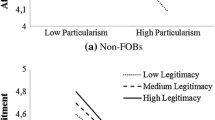Abstract
This study examines the relationship between authoritarianism and attitudes toward unionism. The present study, using a sample of undergraduate business majors, finds a significant and positive correlation between authoritarianism and anti-union attitudes. This suggests that attitudes toward unions are, to some extent, rooted not in simple economic rationality, rather in rigid and dogmatic thought patterns. The implications for labor/management relations, and for successful programs of employee involvement are discussed.
Similar content being viewed by others
REFERENCES
Adorno, T. W., Frenkel Brunswik, E., Levinson, D. J., & Sanford, R. N. (1950). The authoritarian personality. New York: Harper and Row.
Alport, G. W. (1954). The nature of prejudice. Cambridge, MA: Addison-Wesley.
Altemeyer, B. (1988). Enemies of freedom. San Francisco: Jossey Bass.
Applebaum, E., & Batt, R. (1994). The new American workplace. Ithaca, NY: ILR Press.
Bigoness, W. J. & Tose, H. (1984). Correlates of Boting Behavior in a Union Decertificaiton Election. Academy of Management Journal, 27(3):654–659.
Bluestone, B., & Bluestone, I. (1992). Negotiating the future. New York: Basic Books.
Cook, W. N. (1994) Employee participation programs, group-based incentives, and company performance: A union-nonunion comparison. Industrial & Labor Relations Re-view, 47(4), 594.
Cotton, J. (1993). Employee involvement: Methods for improving performance and work attitudes. Beverly Hills, CA: Sage.
Dickens, W. T., & Leonard, J. S. (1985). Accounting for the decline in union membership. Industrial and Labor Relations Review, 38(3), 323–334.
Fiorito, J., Lowman, C., & Nelson, F. D. (1987). The impact of human resource policies on union organizing. Industrial Relations, 26(2),113–127.
Freeman, R., & Medoff, J. (1984). What do unions do? New York: Basic Books.
Freeman, R., & Kleiner, M. (1990). Employer behavior in the face of union organizing drives. Industrial and Labor Relations Review, 43, 351–365.
Freeman, R. (1985). Why are unions faring poorly in NLRB representation election? In T. A. Kochan, (Ed.), Challenges and Choices Facing American Labor, pp. 45–64. Cam-bridge, MA: MIT Press.
Goldfield, M. (1987) The decline of organized labor in the United States. Chicago: University of Chicago Press.
Gordon, M. E. & Long, L. N. (1981). Demographic and Attitudinal Correlates of Union Joining. Industrial Relations, 20(3):306–311.
Gould, W. B., (1993). Agenda for reform: The future of employment relationships and the law. Cambridge, MA: MIT Press.
Kelly, M., & Harrison, B. (1992). Unions, technology, and labor-management cooperation. In L. Mishel & P. Voos, (Eds.), Unions and Economic Competitiveness. N.E. Sharp Publishers.
Kochan, T., Katz, H., & Mckersie, R. B. (1986). The transformation of American industrial relations. New York: Basic Books.
Lawler, J. J. (1990). Unionization and deunionization strategy, tactics, and outcomes. Columbia, SC: University of South Carolina Press.
Lipset, S. M., (Ed.) (1986). Unions in transition: entering the second century. San Francisco: Institute for Contemporary Studies Press.
Morand, D. (1994). The changing situation of U.S. labor law. Labor Law Journal, 19(3).
National Labor Relations Act of 1935, amended by Labor Management Relations act of 1947, 29 U.S.C. 141–187.
Puette, W. J. (1992). Through jaundiced eyes: How the media view organized labor. Ithaca, NY: ILR Press.
Ray, J. J. (1976). Do authoritarians hold authoritarian attitudes? Human Relations, 29(4), 307–325.
Rokeach, M. (1960). The open and closed mind. New York: Basic Books.
Schriesheim, C. A. (1978). Job Satisfaction, Attitudes Toward Unions and Voting in a Union Representation Election. Journal of Applied Psychology, 63(5):548–552.
Sherif, M., & Sherif, C. W. (1964). Reference groups. Chicago: Henry Regnery Company.
Tajfel, H. (1981). Human groups and social categories: Studies in social psychology. Lon-don: Cambridge U. Press.
Thurow, L. (1992). Head to head: The coming economic battle among Japan, Europe, and America. New York: Morrow.
Troy, L. (1986). The rise and fall of American trade unions: The labor movement from FDR to RR. In S. M. Lipset (Ed.), Unions in Transition: Entering the Second Century San Francisco: Institute for Contemporary Studies.
Troy, L. (1990). Is the U.S. unique in the decline of private sector unionism? Journal of Labor Research, XI, 111–143.
Turner, L. (1991). Democracy at work: Changing world markets and the future of labor unions. Ithaca, NY: Cornell U. Press.
Uchitelle, L. (1995, June 2). Survey points to a cause of union decline. New York Times, pp. D-l.
Uphoff, W. H., & Dunnette, M. D. (1956). Understanding the union member. Minneapolis, MN: U. of Minnesota Press.
Van Maanen, J. (1975). Breaking in: A consideration of organizational socialization. In R. Dubin (Ed.), Handbook of Work, Organizations, and Society. Chicago: Rand-McNally.
Weiler, P. (1990). Governing the Workplace. Cambridge, MA: Harvard University Press.
Author information
Authors and Affiliations
Rights and permissions
About this article
Cite this article
Morand, D.A. Exploring the Relationship Between Authoritarianism and Attitudes Toward Unions. Journal of Business and Psychology 12, 343–353 (1998). https://doi.org/10.1023/A:1025079530919
Issue Date:
DOI: https://doi.org/10.1023/A:1025079530919



